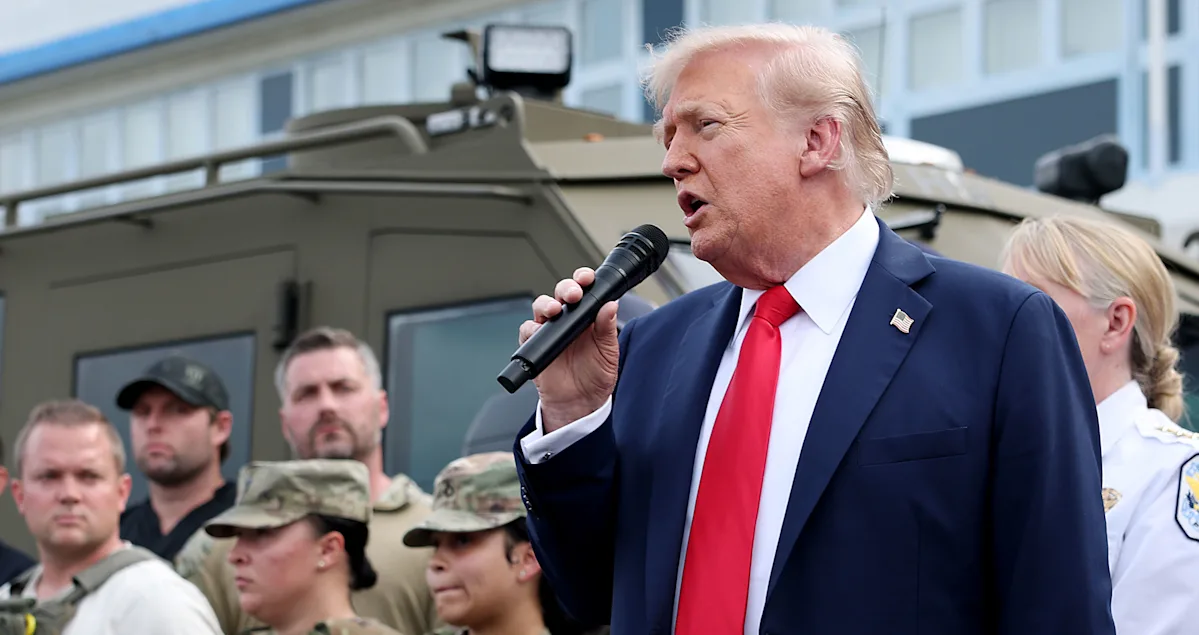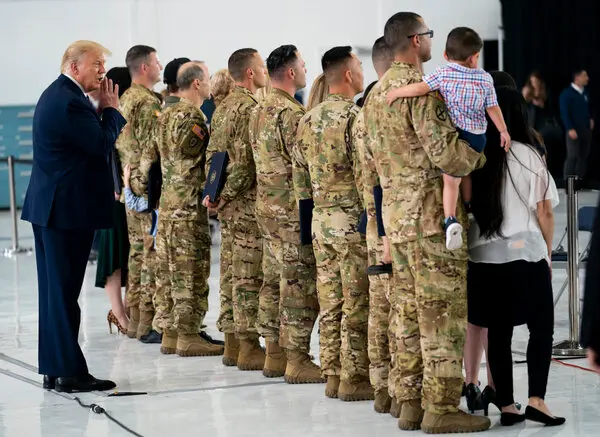“Donald Trump’s plan to deploy the National Guard is sparking more backlash than support, according to a new poll.”
A new poll has revealed that most Americans oppose Trump’s National Guard deployment, signaling a growing divide between the former president’s proposals and public opinion. While Trump has framed the deployment as a way to strengthen security and restore order, the survey shows that many citizens view the move with skepticism and concern.

For everyday Americans, the idea of using military force on U.S. soil feels more like an escalation than a solution. Instead of reassurance, the prospect of National Guard units being deployed in communities has left many uneasy about what it means for democracy, civil liberties, and daily life.
The poll results highlight a critical question: is Trump’s tough approach aligned with the values and priorities of the people he hopes to lead again?
What the Poll Reveals
The latest survey paints a clear picture: most Americans oppose Trump’s National Guard deployment. According to the poll, a majority of respondents said they were uncomfortable with the idea of using the National Guard in this way, viewing it as an overreach of federal power rather than a necessary security measure.
Breaking it down further, opposition stretched across a wide range of groups. Younger voters and independents expressed the strongest resistance, but even among older demographics and some Republican-leaning voters, the plan didn’t get overwhelming support. The numbers suggest that skepticism about Trump’s approach isn’t confined to one political side—it’s more widespread.
The survey also revealed why people are uneasy. Concerns centered around potential harm to civil liberties, the fear of militarizing local communities, and doubts about whether deploying the National Guard would actually solve the problems Trump claims it would address.
In short, the poll results show not just disagreement, but a deep discomfort with the idea of turning to the military as a domestic solution.
Why Americans Oppose the Deployment
For many people, the idea of Trump’s National Guard deployment feels less like protection and more like an intrusion. Instead of creating a sense of safety, the prospect of troops in neighborhoods sparks worries about what it means for everyday freedoms. This is one of the main reasons Americans oppose Trump’s plan—they fear it could blur the line between civilian life and military force.
Critics also question whether such a deployment would truly address the issues Trump points to, or if it would only escalate tensions. For families, small businesses, and communities, the thought of armed soldiers in the streets doesn’t reassure—it unsettles.
There’s also a deeper concern about precedent. If the National Guard is used this way now, what might it be used for in the future? For many, the worry isn’t just about Trump’s proposal—it’s about the long-term impact on democracy, civil liberties, and the role of the military in civilian affairs.
In short, opposition isn’t only about politics. It’s about everyday Americans asking whether this approach makes their communities safer—or more divided.
Trump’s Justification for the National Guard Plan
From Trump’s perspective, the National Guard deployment isn’t about intimidation—it’s about restoring order. He has framed the plan as a necessary step to deal with what he calls “chaos” in cities and communities. In his view, the Guard would serve as a stabilizing force, filling in where local law enforcement may not have the resources or manpower.
Trump has long built his political brand around strength and control, and this proposal reflects that approach. To his supporters, the deployment is seen as proof that he’s willing to take bold action when traditional methods seem too slow or ineffective. For them, it’s less about soldiers in the streets and more about having a leader who promises to get tough when things feel uncertain.

However, his reasoning has sparked heated debate. While Trump points to safety and security, critics argue that the plan risks doing the opposite—escalating tensions rather than calming them. Still, his justification is clear: he believes a strong show of force is the quickest way to restore confidence in public safety.
Political Reactions and Debate
The idea of deploying the National Guard has quickly become a political lightning rod. Across Washington and beyond, reactions are deeply divided along familiar partisan lines. Many Democratic leaders warn that such a move would be an overreach of federal power, arguing that it risks militarizing communities and undermining trust between citizens and the government. They stress that addressing underlying issues—like poverty, housing, and local policing reforms—would be a far better path than bringing in troops.
On the other hand, several Republican allies have echoed Trump’s justification, saying the plan highlights his commitment to law and order. They frame the deployment as a matter of public safety rather than politics, claiming that communities need reassurance when unrest grows.
Beyond party lines, however, there’s a wider debate playing out. Civil rights groups, legal scholars, and everyday citizens are weighing in, raising questions about constitutional limits, local autonomy, and whether the presence of the Guard would calm tensions or inflame them further. What’s clear is that this isn’t just a policy decision—it’s a test of how Americans balance security, freedom, and trust in government.
FAQs
Q1: What did the poll say about Trump’s National Guard plan?
The poll showed that a majority of Americans are not in favor of deploying the National Guard in this way. Many respondents expressed concerns about civil liberties, community trust, and whether troops are the right solution to social challenges.
Q2: Why are people opposed to the National Guard deployment?
Opposition comes from fears of militarization of communities and skepticism about whether soldiers should handle issues that are often rooted in social and economic problems. Critics believe it could make tensions worse instead of solving them.
Q3: What reasons did Trump give for the plan?
Trump defended the idea by framing it as a way to maintain law and order. He argued that the National Guard would help stabilize communities facing unrest, but his reasoning has sparked intense debate.
Q4: How have political leaders reacted?
Democratic leaders and civil rights groups have strongly opposed the plan, warning it could set a dangerous precedent. Meanwhile, some Republican allies back the move, saying it shows Trump is prioritizing safety and control.
Q5: What does this debate mean for the future?
The controversy reflects deeper divides in American politics—between those who see strong federal intervention as necessary for safety and those who fear it erodes freedoms and local control. How this unfolds may shape future policies on national security and civil rights.